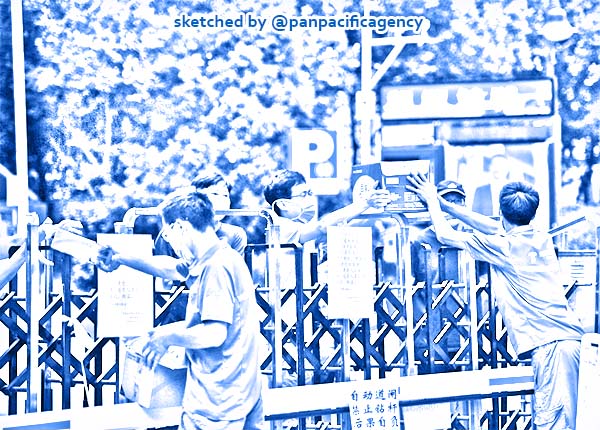Thousands checked as coronavirus testing spreads to Beijing universities

Delivery workers hand parcels to people in a residential compound in Beijing's Xicheng district on Wednesday. Restrictions on access to all communities have resumed as the city increased the level of its COVID-19 emergency response. CHEN ZHONGHAO/XINHUA. Sketched by the Pan Pacific Agency.
BEIJING, Jun 28, 2020, SCMP. More than 100,000 students, faculty and staff from nearly 100 universities in Beijing lined up on Sunday to be tested for Covid-19 as part of the city’s effort to curb the latest outbreak of the virus which has so far led to 311 local cases of the disease, South China Morning Post reported.
The mass testing brings the number of Beijing residents who have been checked to more than 7 million, city authorities said on Sunday, since a cluster of cases emerged in early June linked to the Chinese capital’s sprawling Xinfadi wholesale food market.
Tests have been carried out on people living close to markets, as well as those who work in the public domain, including banks, transport, dining facilities, beauty parlours, delivery services and community workers.
At a news conference on Saturday, the city authorities warned residents not to lower their guard, with cases spreading through different channels and locations and affecting many different industries.
Test results for the university cohort are expected by midnight on Sunday, with 20 medical facilities involved in the process. State broadcaster CCTV reported on Saturday that the next step would involve testing about 3 million people working in the rest of Beijing’s education sector.
Liu Mengyao, an administrative employee at a Beijing university, arrived on campus at 8.30am on Sunday morning for the nucleic acid test. After swiping her identity card she was given a long cotton swab and sampling tube before joining the queue.
Liu told the South China Morning Post that the wait had not been long before a medical worker swabbed her nose, dabbing in circles, before saving the sample in the tube. “It was quick,” she said, adding that the medical staff had told her the results would be ready that night.
Liu said she was continuing to use public transport and was relying on luck to avoid catching the virus. But she has kept her family at home since the start of the outbreak, preferring not to take her child outside their residential compound. But, she said, with the strong efforts taken by the city authorities to control the spread, she was hopeful it would be over soon.
“There have been about 10 new cases every day in Beijing, and most are in Daxing or the southern Fengtai district. I think the outbreak will soon be controlled.”
The annual college entrance exams, or gaokao , which usually take place in early June, have been postponed for a month and multiple cities in China are taking measures to reduce the risk of infection when they begin on July 7. These include checking students’ temperatures every day for two weeks before sitting the college entrance exams. They are also not to leave their provinces.
In some cities, local governments have organised for students to get nucleic acid tests and any with respiratory symptoms will take the exams in a separate room. Specific requirements have also been put in place for seat assignments, to keep students at least 80 centimetres apart to reduce the risk of infection.
Also on Sunday, the Beijing Film Academy announced that all of its entrance tests would be moved online.